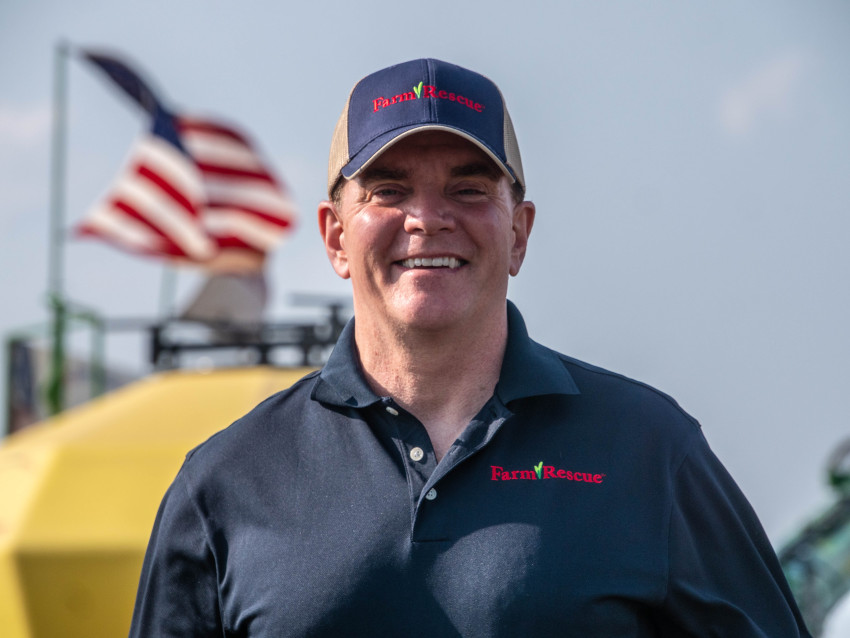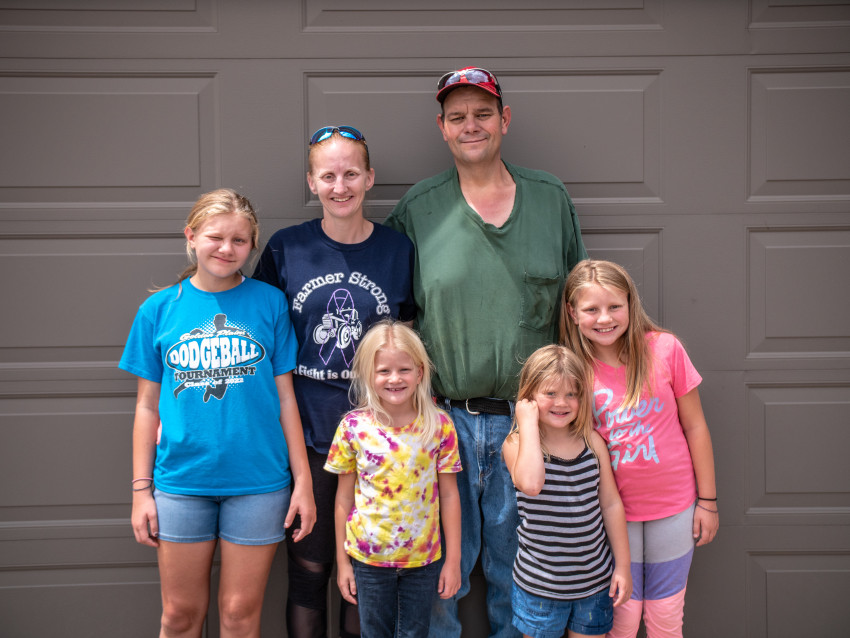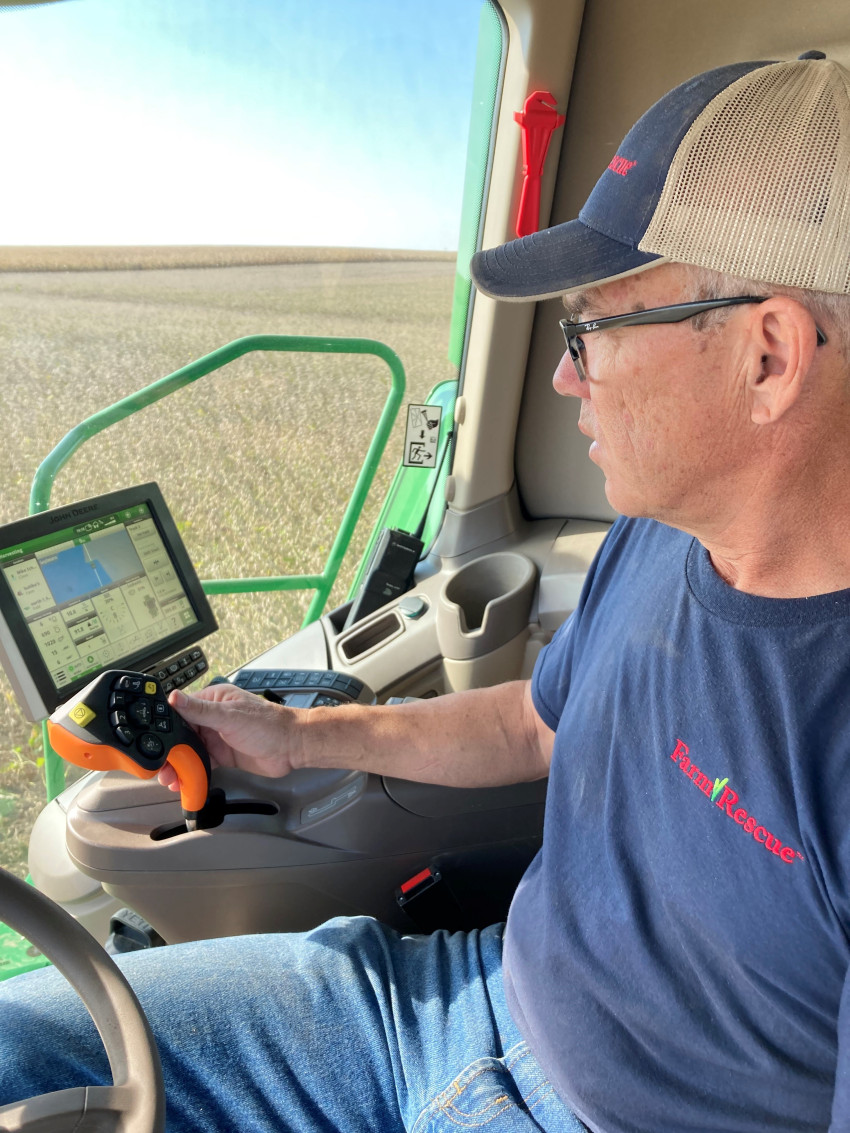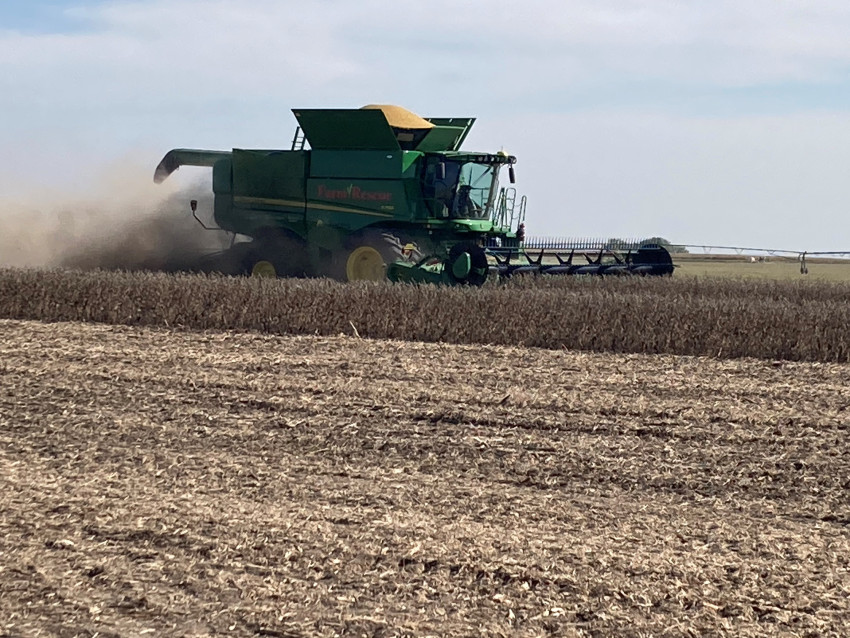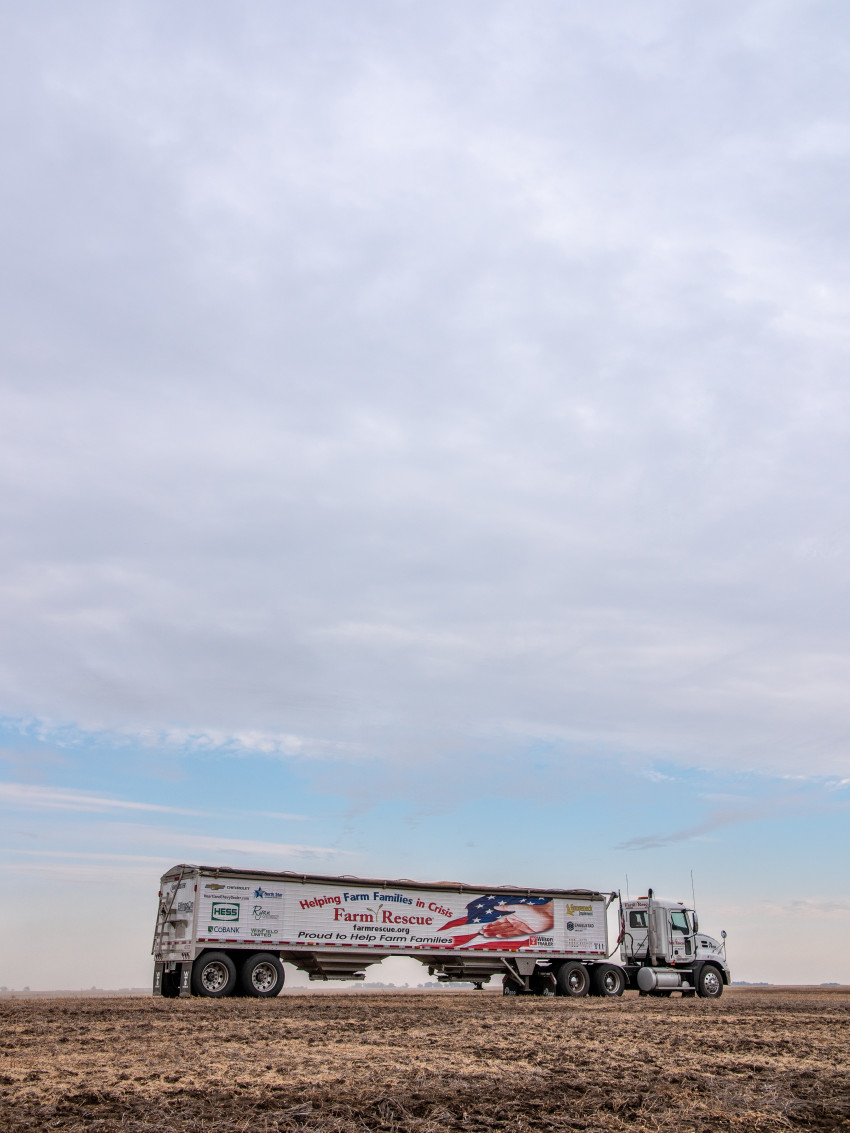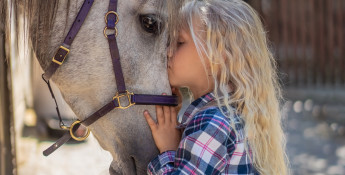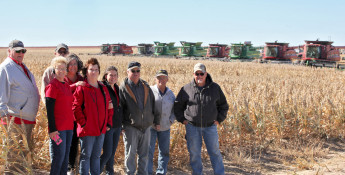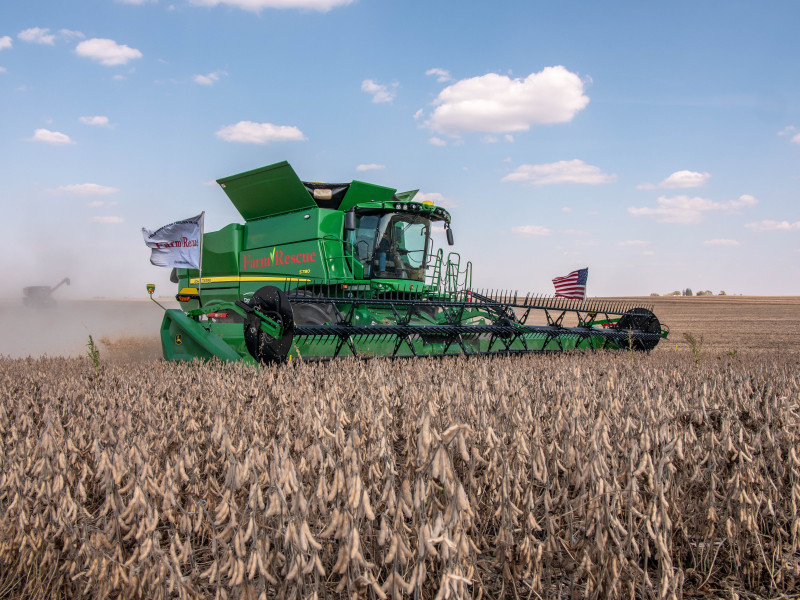By Sheridan Wimmer on March 5, 2024
Farm Rescue aids farmers in tough times
Program utilizes volunteers to help farmers and ranchers get their work done
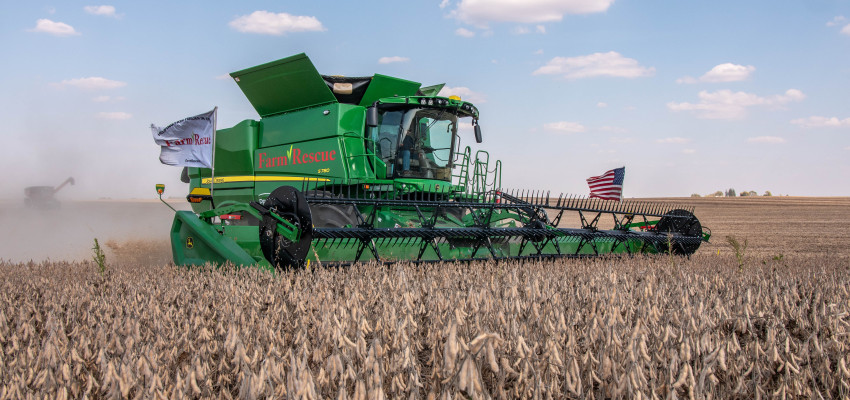
Farmers and ranchers are a tough bunch. Their work ethic is strong, their fortitude unwavering. But there are times in all of our lives when proverbial lemons are handed to us and we (begrudgingly) must seek help. That’s what friends are for. And that’s what Farm Rescue is – friends to farmers and ranchers.
FARM RESCUE IS HERE TO HELP
Farm Rescue is a North Dakota-based nonprofit founded by Bill Gross. Gross, an airplane pilot, grew up on a farm and over time saw the changing landscape of agriculture in his state from a bird’s eye view and memories of his rural upbringing.
Thinking through retirement, he wanted to be a beacon to farmers who are going through a major injury or illness – so in 2005, he launched Farm Rescue.
The organization serves farmers who are experiencing a crisis within their family. They organize volunteers throughout the Midwest to offer planting, haying, harvesting, commodity hauling and livestock feeding assistance for farmers and ranchers who have experienced a major injury, illness or natural disaster. Farm Rescue provides all of this at little to no cost to the family experiencing days when there aren’t enough hands to manage life’s lemons.
Ben Smith is a regional operations manager at Farm Rescue for the “corn belt” states – Iowa, Illinois, Kansas and Nebraska. He grew up on a farm in southeast Iowa, went to school at Iowa State University and had dreams of managing a farm or having one of his own. After he worked for some agricultural companies and farmers, he found his way to Farm Rescue.
“I’d been working on a large farm for a few years and hoped to be able to be a volunteer for Farm Rescue,” he says. “It never ended up being a good time to leave the farm for a week, but then I saw Farm Rescue was hiring for my position and thought it was intriguing. I could combine my farming skills and my love of farming with my desire to serve others.”
Logistics and planning take up most of Smith’s role. He helps farmers submit assistance applications and makes sure the plan they develop is the way the farmer wants the work done. Once that is developed, Smith will look at their volunteers to see who would be a good fit for what they call a “case” then organize machinery needs for the work.
Smith meets with the crew of volunteers and the family the first day they’re on a case to make sure everything is ready to go and the volunteers have the information they need.
HARVEST HELPERS
It was fall harvest for Chad Focke in Rexford, one of the busiest times of the year for farmers who grow crops like corn and soybeans, when he started having trouble swallowing. He eventually went to the doctor and was diagnosed with esophageal cancer.
“I had about a 15-day stay at the hospital when I had surgery,” Focke says. “My wife, Mandy, was phenomenal. She did my job and her job and every other job around. I came home and was trying to recover when she learned about Farm Rescue.”
Mandy called Farm Rescue and the Fockes had help soon after. Farm Rescue was on the job, and the Focke family was impressed with their quality of work, saying they treated their acres like they were their own.
“For them to leave their family for a week or two like they’re doing, it’s wonderful we’ve got an organization like Farm Rescue setting it all up,” Chad says.
VOLUNTEER FARM WORK
Volunteers for Farm Rescue are selfless individuals who are prepared for phone calls to nearby cases and understand the busy seasons of farmers and ranchers. Farm Rescue seeks individuals who have a strong desire to serve and help others and don’t mind a bit of mess.
“Farming can be a dirty job sometimes,” Smith says. “Obviously most of our work involves operating and running large farm machinery, so volunteers who have that knowledge are great. But if there are volunteers who want to help but don’t have that experience, we still find a place for them.”
Glenn Biederman grew up on a farm near Independence, then had a career at John Deere for 33 years before retiring and settling in Louisburg. He learned about the opportunity to volunteer for Farm Rescue through John Deere since the company is a major sponsor of the program.
“When I retired around five years ago, some of my coworkers encouraged me to sign up to become a Farm Rescue volunteer,” Biederman says. “I love farm equipment and I love agriculture since I grew up on a farm so that background and the people I know involved with Farm Rescue made me excited to sign up to help.”
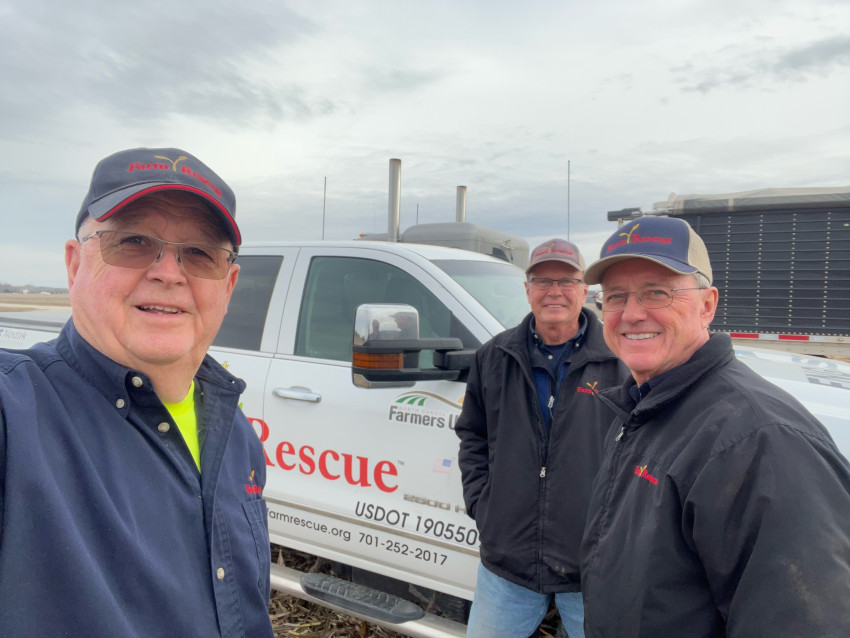
Glenn Biederman, second from the left, on a Farm Rescue case he volunteered for.
Biederman has helped farmers plant and harvest crops and baled hay for the cases he’s been assigned in the four years he’s volunteered.
“The work required of volunteers just depends on the case,” he says. “We had a situation last spring with a father-son operation and the son was beginning to take over the farm but was killed. They were in the middle of planting, so we went and helped the parents get their crop planted.”
When families are coping with that kind of loss in the middle of planting season, hope comes in the form of Farm Rescue.
“I think we bring a level of comfort to the farmers or ranchers we’re helping,” Biederman says. “We can kind of distract them from the things going on around them. We pray with them sometimes. Letting them know somebody’s there with them. I think that’s a big thing that really helps. I remember one of the cases I was on, a 40-year-old farmer from Minnesota who has his own young family drove four hours to help us one day. I asked him why he came all that way to help, and he said, ‘When my dad got really sick five years ago, I had 50,000 bushels of grain to haul, cattle to feed, I had all of these things on my shoulders, and I didn’t know what to do first.’ He said, ‘I don’t want anybody to have to feel that way. It was really hard.’”
For Biederman, he gives credence to his faith for his depth of empathy and his own experience growing up with a life-altering event in his family.
“My dad was disabled when I was about 14,” he says. “At that age, I had to take over a lot of the farming work because my dad couldn’t farm anymore. I never looked at it as a burden. It was a lot of fun for me at that age to have the learning experience and we made it through.”
Although Biederman’s dad couldn’t help farm in a traditional way, he did clean the house and do laundry.
“The only thing my dad didn’t do at home was cook, thank goodness,” Biederman jokes.
Another Kansas volunteer, Bruce Opheim from Salina, grew up on a farm in Minnesota, then was in the Air Force before he started working for Fastenal, where he’s been for more than 30 years and what brought him to Kansas. He saw the Farm Rescue opportunity and with his CDL, was a perfect fit for their truck driver needs.
Opheim’s first case was in Nebraska to harvest soybeans for a farmer who lost all his equipment in a fire.
“A bad storm was coming, so they put all of their equipment in their shed,” he says. “A battery cable caused a spark and wiped everything out.”
Fortunately, the fire occurred overnight when the family was sleeping, so there weren’t injuries, but the farmer knew he needed a different way to harvest his crop, so Farm Rescue lined up two volunteers.
“Despite the circumstances for meeting the families when I volunteer, that’s my favorite part about Farm Rescue,” Opheim says. “I meet these new people I am able to help out.”
SEEKING ASSISTANCE
For some of us, asking for help isn’t in our DNA. The Focke family understands how it can be difficult at times to ask for help, but when the family farm is at play, it’s necessary.
“Asking for a little help, there’s nothing wrong with it,” Focke says. “These volunteers are wonderful.”
Chad Focke is doing well after his chemotherapy and radiation treatments and credits the Farm Rescue volunteers for being able to sufficiently rest.
Biederman remembers one of his cases where a father-son operation needed help when the patriarch was diagnosed with Lou Gehrig’s disease. Of course, the father had to cut back on his participation in the farm work.
“They had corn to harvest and wanted to roll up corn stover into round bales to feed their cows over the winter,” Biederman says. “The son’s wife was battling breast cancer and was having surgery in two weeks. The couple had three young children, were in the middle of building a new home, there was a lot on their plates.”
Biederman says it was hard for them to admit they needed assistance, but once he and other volunteers were at the farm, the family was ready for help. Volunteers were there for 10 days and helped get everything in place.
“It’s hard to get farmers who are independent to ask for help,” Biederman says. “But then the son said to me, ‘You’ll never know how much you’ve helped us.’”
The wife’s surgery went well, and the family could take some weight off their shoulders knowing some of their work was finished.
“Getting families over that hump is the way I see it,” Biederman says. “The future of their operation may look completely different, but when tragedy strikes, we’re there for a bit of time to get them better situated to have those conversations and decisions about the future.”
EQUIPMENT ENDEAVOR
When a farmer or rancher requests assistance, Farm Rescue will make connections with volunteers and organize equipment – much of it owned by Farm Rescue – to be hauled to the case’s site. If the case is too far to haul equipment, many John Deere dealers will offer to rent equipment. The farmer or rancher is responsible for inputs like gas, seed and feed.
Sometimes, a good Samaritan will see the Farm Rescue logo on the side of equipment or trucks and offer to help.
“Last year we had two tractors we were taking down through the Dakotas and we pulled into a co-op to fuel up,” Biederman says. “We started fueling and it was adding up to around $2,500. There was a kind farmer in North Dakota at the co-op who saw us and told them to put it on his bill. He paid for all of it.”
“It’s important for people to notice our machines that say Farm Rescue on them,” Smith says. “If our name hadn’t been on that equipment, the farmer wouldn’t have known it was us and wouldn’t have known to help.”
Because many of the Farm Rescue volunteers already have experience with equipment, there isn’t a huge lift to train them on how to operate a combine or grain cart. But in farming and ranching, safety is a top priority, and Farm Rescue is dedicated to the safety of its volunteers. Their application process for volunteers includes training modules that go over safety protocols when they’re working on a case.
“Safety comes first in everything we do,” Smith says. “We don’t want anybody to get hurt, and we have a reputation and assets to protect, too. Training is key to making sure everyone on the crew is on the same page because sometimes the way things run on someone else’s farm isn’t what a volunteer might be used to. We need volunteers with the mindset that these acres are a family’s, and they need us to do the job and to do it well and safely. Safety is paramount to what we do.”
“Ben came out and set up the case and made sure we had all the equipment we needed,” Opheim says. “He stayed there with us for three days to make sure we were aware of the safety protocols and to get us going and acclimated.”
The individuals in farming and ranching are tough, resilient and hardworking. Sometimes, though, we all need extra hands to juggle the lemons of life. Luckily, Farm Rescue’s team and volunteers offer an abundance of support – emotionally and physically.
If you know a farm family in need of Farm Rescue’s help or you’d like to become a volunteer, learn more at www.farmrescue.org.
SIDEBAR: AN EXPERIENCE IN UNITY:
Bernt Nelson, an economist at American Farm Bureau Federation, wrote about his family’s experience with Farm Rescue when cancer became an uninvited guest on his farm in North Dakota.
“Thanks to Farm Rescue, some of the darkest days of our lives turned into unity,” Nelson writes. “Grace poured out from our community, families and friends during this time of need. This is just one of a thousand stories but is a testimony to the blessings this wonderful organization gives freely with no expectation of return. Farm Rescue encompasses the very image of God’s grace through community. From my perspective, this is the true spirit of agriculture.”
Read about his story of his family’s trials with cancer, then unity with Farm Rescue.
YOU MAY ALSO ENJOY:

